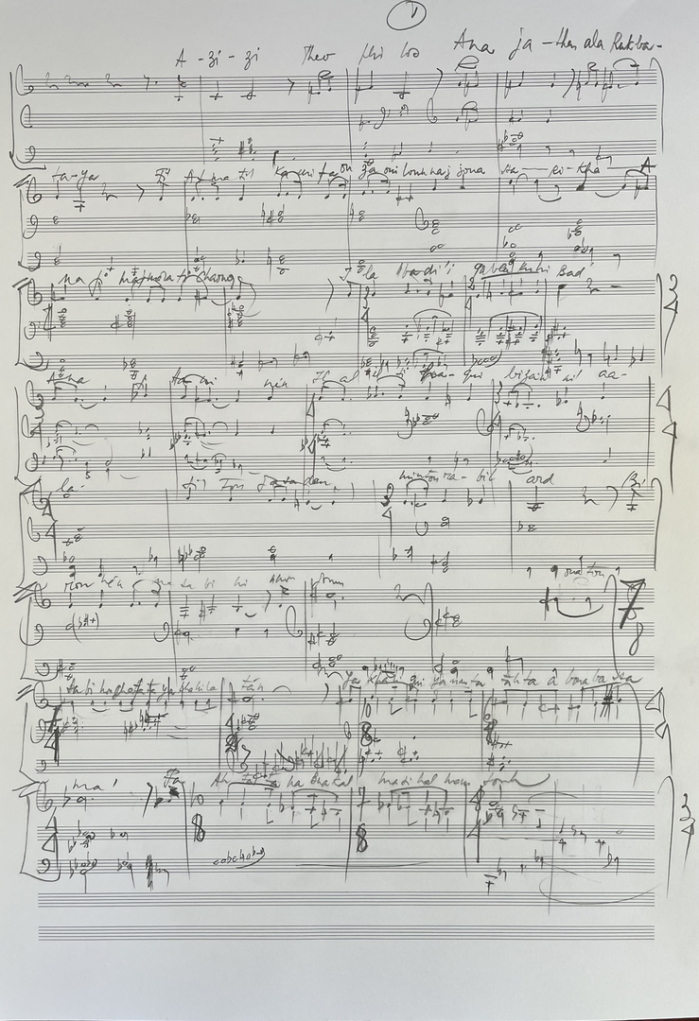
Aš-šawqu ila˘ s-samā’ for alto voice, violin, viola, cello and piano
Title, Duration, Place, Year, Publisher, Dedicated to, Premiere (performer(s), place, date)
Aš-šawqu ila˘ s-samā’ for alto voice, violin, viola, cello and piano, 5', Bayonne, 2016, Schott, to Fadia Tomb El-Hage, Fadia Tomb El-Hage, musiciens de l'Orchestre Philharmonique du Liban, Direction Père Khalil Rahmé, Notre-Dame University, Zouk-Mosbeh, Liban, 17.02.18.
Note de programme
Aš-šawqu ila˘ s-samā’ (Passion pour l'Au-delà) est une mélodie pour voix
d'alto, violon, alto, violoncelle et piano, bâtie sur un poème du philosophe libanais
Kamal El-Hage. L'œuvre se développe en composition continue, dans un style
syllabique et madrigaliste, dans un souci d'intelligibilité d'un texte expressif, dense et
témoignant d'une grande profondeur chrétienne. Le piano et les cordes figurent la
chair et l'ossature de l'ardente conversation intérieure. Naji Hakim
Programme note
Aš-šawqu ila˘ s-samā’ ( Passion for the Beyond ) is a melody for alto voice,
violin, viola, cello and piano, built on a poem by Lebanese philosopher Kamal El-
Hage. The work develops in a through composed, syllabic and madrigalistic style,
with a concern for intelligibility of the expressive and dense text, testifying a great
Christian depth. The piano and strings figure the skeleton and flesh of the ardent
inner conversation. Naji Hakim
Présentation du poème
Aš-šawqu ila˘ s-samā’
Ce poème est tiré d’une œuvre posthume du philosophe libanais Kamal Youssef
El-Hage, intitulée “… Et Jésus-Christ est” et se voulant une tentative de synthèse
personnelle des vérités évangéliques avec un verbe arabe savoureux alliant rigueur
philosophique et ferveur mystique. En s’y adressant toujours à un ami imaginaire,
Théophile, le philosophe chrétien a voulu imiter l’évangéliste Luc, qui avait rédigé
son exposé de la Bonne Nouvelle à l’intention de “l’excellent Théophile”.
Presentation of the poem
This poem is excerpted from a posthumous work by the Lebanese philosopher
Kamal Youssef El-Hage, entitled “…And Jesus-Christ is” and endeavoring a
personal synthesis of the evangelical truths with an exquisite Arabic style
combining philosophical rigor and mystical fervor. By constantly addressing
himself therein to an imaginary friend, Theophilus, the Christian philosopher
wanted to emulate the evangelist Luke, who had dedicated his account of the
Gospel to the “most excellent Theophilus”.
Youssef El-Hage
L'auteur
Kamal Youssef El-Hage (1917-1976) est un éminent philosophe libanais dont
l’œuvre considérable et novatrice se distingue par une harmonie entre foi et raison
ainsi que par des thèses résolument engagées prônant la liberté et la spécificité
ontologique du Liban, la portée universelle de sa convivialité islamo-chrétienne, la
nécessité de promouvoir la langue arabe comme élément prééminent de la
personnalité culturelle libanaise, et la mise au jour des trésors de la philosophie
libanaise à travers les âges. Ses œuvres complètes en 14 volumes, dont ses écrits
posthumes, ont été publiées en 2014.
The author
Kamal Youssef El-Hage (1917-1976) is a distinguished Lebanese philosopher
whose considerable amount of innovative writings is characterized by harmony
between faith and reason along with strongly engaged assertions advocating
freedom and ontological specificity for Lebanon, universal relevance for its
Christian-Islamic convivence, promotion of Arabic as a preeminent element in
Lebanon’s cultural personality, and unearthing the treasures of Lebanese
philosophy across the ages. His complete works in fourteen volumes, including his
posthumous writings, have been published in 2014.
Youssef El-Hage
Le poème/The poem Aš-šawqu ila˘ s-samā’
|
Passion pour l’au-delà Paroles : Kamal Yousef El-Hage Musique et arrangement: Naji Hakim Chant: Fadia Tomb El-Hage Cher Théophile, Je suis agenouillé, dans la ténèbre révélante, cultivant le dialogue intérieur tonitruant. Je suis brasier brûlant de passion pour le Premier avant tout commencement. J’ai nostalgie de rejoindre la splendeur de l’empyrée. Je suis devenu un corps de glèbe de terre habité d’une âme de lustres d’étoiles. Et mes lèvres ébahies louangent: O mon Créateur, Toi qui as entrouvert les portes des cieux Pour nous faire don de Ton Fils oignant et oint… Qui allia le loin du divin et le près de l’humain… Avec Lui le pourquoi disparaît… le comment s’abolit… le où s’éclipse… et le quand se dissipe. Cher Théophile, La nuit est à son comble… et le silence étend son voile sur le sanctuaire. Je suis debout sur le parvis, après la prière, tournant le visage vers le ciel, et le dos à la terre. Je me suis mué en un être astré En une eurythmie de lumière En un verbe au-dessus du verbe.
Passion for the Beyond Lyrics by Kamal Yousef El-Hage Music and arrangement by Naji Hakim Interpreted by Fadia Tomb El-Hage Dear Theophilus, I am kneeling, in the revealing gloom, engaged in thunderous innermost dialogue. I am a blaze of passion for the Inceptor before any inception. I long for joining the splendor of the empyrean. I turned into a body of earthly soil with a soul of stellate lights. And my startled lips praise: O my Creator You who set the gates of heaven open To grant us Your anointing and anointed Son Who blended the divine’s far and the human’s near. With Him the why vanishes… the how is abolished… the where fades… and the when dissipates. Dear Theophilus, Night has grown full dark… and silence enfolds the sanctuary. I am standing in the forecourt, my face to heaven, and my back to Earth. I became a stellary being A eurythmia of light A word atop the word.
|
الشَوقُ إلى السَماء كلمات: كمال يوسف الحاج ألحان وتوزيع: ناجي حكيم أداء: فادية طنب الحاج عزيزي ثاوُفيلوسْ، أنا جَاثٍ على رُكبتَيَّ، في العَتْمةِ الكاشفة، أُزاوِلُ النَجْوى الصَارِخَة... أنا في مِجْمَرَة الشَوقِ إلى البادِئِ قبلَ كُلِّ بَدءْ... أنا في حَنينٍ إلى الالتحاق بزَيْنِ العَلاءْ... صِرتُ جَسَدًا من ترابِ الأرض بروحٍ من مَصابيحِ النُجومْ...
وتُسبِّحُ شَفَتايَ الذاهِلتانْ... يا خالِقي... يا من فَتَحْتَ أبوابَ السماءْ... فأَعطَيتَنا ابْنَكَ الماسِحَ المَمْسوحْ... الذي جَمَعَ بَعِيدَ اللاهوتِ وقَرِيبَ الناسوتْ... معه تَزول اللِمَاذا... وتَبطُلُ الكَيفْ... وتَنحَجِبُ الأَينْ... وتَضمَحِلُّ المَتى.
عزيزي ثاوُفيلوسْ... اللَيلُ في عِزِّهِ... والصَمتُ يُمَندِلُ المَعبَدْ. وقفتُ في ساحِهِ، بعدَ الصلاةْ، وَجهي إلى السَماءِ وظَهري إلى الأرض... تَحَوَّلتُ إلى إنسانٍ مُكَوْكَبْ. إلى نَسَقٍ من نورْ... إلى كَلِمةٍ من فَوقِ الكَلِمةْ. |

